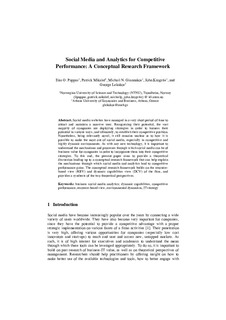Social Media and Analytics for Competitive Performance: A Conceptual Research Framework
Journal article, Peer reviewed
Accepted version
Permanent lenke
http://hdl.handle.net/11250/2465736Utgivelsesdato
2017Metadata
Vis full innførselSamlinger
Originalversjon
Lecture Notes in Business Information Processing. 2017, 263 209-218. 10.1007/978-3-319-52464-1_19Sammendrag
Social media websites have managed in a very short period of time to attract and maintain a massive user. Recognizing their potential, the vast majority of companies are deploying strategies in order to harness their potential in various ways, and ultimately, to establish their competitive position. Nonetheless, being relevantly novel, it still remains unclear as to how it is possible to make the most out of social media, especially in competitive and highly dynamic environments. As with any new technology, it is important to understand the mechanisms and processes through which social media can be of business value for companies in order to incorporate them into their competitive strategies. To this end, the present paper aims to provide a theoretical discussion leading up to a conceptual research framework that can help explain the mechanisms through which social media and analytics lead to competitive performance gains. The conceptual research framework builds on the resource-based view (RBV) and dynamic capabilities view (DCV) of the firm, and provides a synthesis of the two theoretical perspectives.
